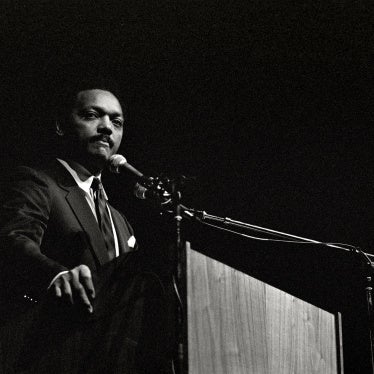Five years after the U.S.-led multinational intervention in Haiti, Human Rights Watch criticized the U.S. government for its refusal to return seized army and death-squad documents to Haitian law enforcement officials.
U.S. troops entering Haiti on September 19, 1994 seized approximately 160,000 documents, and Washington has said that it will only return the materials once U.S. citizens' names have been deleted. The government of Haiti has insisted that the documents must not be edited.
The group also called on the U.S. government to deport paramilitary leader Emmanuel "Toto" Constant to Haiti, where he is wanted for human rights abuses, including torture and extrajudicial executions.
"Five years after U.S. troops seized these materials, Washington continues to keep this potentially rich source of evidence abuses away from Haitian prosecutors," said Kenneth Roth, Executive Director of Human Rights Watch. "It certainly looks like the administration is trying to conceal wrongdoing in Haiti on the part of the U.S. government."
U.S. forces seized approximately 160,000 pages of documents and other materials from paramilitary FRAPH (Front for the Advancement and Progress of Haiti, Front pour l'Avancement et le Progrès d'Haïti) and Haitian military offices in the fall of 1994, reportedly including "trophy" photographs of torture victims, audio and videotapes of torture sessions, membership applications for FRAPH, passports, identification cards, and business records. The material was taken to the United States without the knowledge or consent of Haitian authorities.
FRAPH reportedly was founded with Central Intelligence Agency (CIA) assistance and "Toto" Constant, its director, has repeatedly stated that he received regular CIA payments. FRAPH members were responsible for human rights atrocities under the military government that ruled Haiti from 1991 to 1994, including extrajudicial executions, torture, and rape.
The U.S. government has maintained that U.S. citizens' names and identifying information must be deleted from the materials before they are returned to Haitian custody. This apparently serves the illegitimate purpose of covering up possible U.S. complicity in political murder and other abuses, particularly the apparent involvement of U.S. intelligence agents with the military regime and FRAPH.
Human Rights Watch said that the U.S. government's refusal to cooperate with Haiti's efforts to build the rule of law has damaged U.S. credibility. "While the U.S. government formally endorses programs designed to improve Haiti's justice system, it is simultaneously obstructing efforts to establish justice for Haitian human rights victims," said Roth. "Washington is working against itself."
The U.S. government also impeded the prosecution of human rights crimes in Haiti by reaching a secret 1996 settlement with Constant, allowing him to remain in the United States. Constant was detained in the U.S. and ordered deported by a U.S. immigration judge who found that "allowing [Constant] to remain in the United States fosters the impression that the United States endorses FRAPH and its actions." Nevertheless, on June 14, 1996, the Clinton administration decided to release him into the United States rather than return him to Haiti, provided him with a work permit, and required that he abide by a gag order. Constant also retained the option to choose deportation to a country other than Haiti or the Dominican Republic, subject to U.S. approval. He now lives in Queens, New York.
Among those who have called for the return of the documents to Haiti are the United Nations International Civilian Mission to Haiti, the Independent Expert on Haiti of the UN Human Rights Commission and 69 current or former members of the U.S. Congress.








